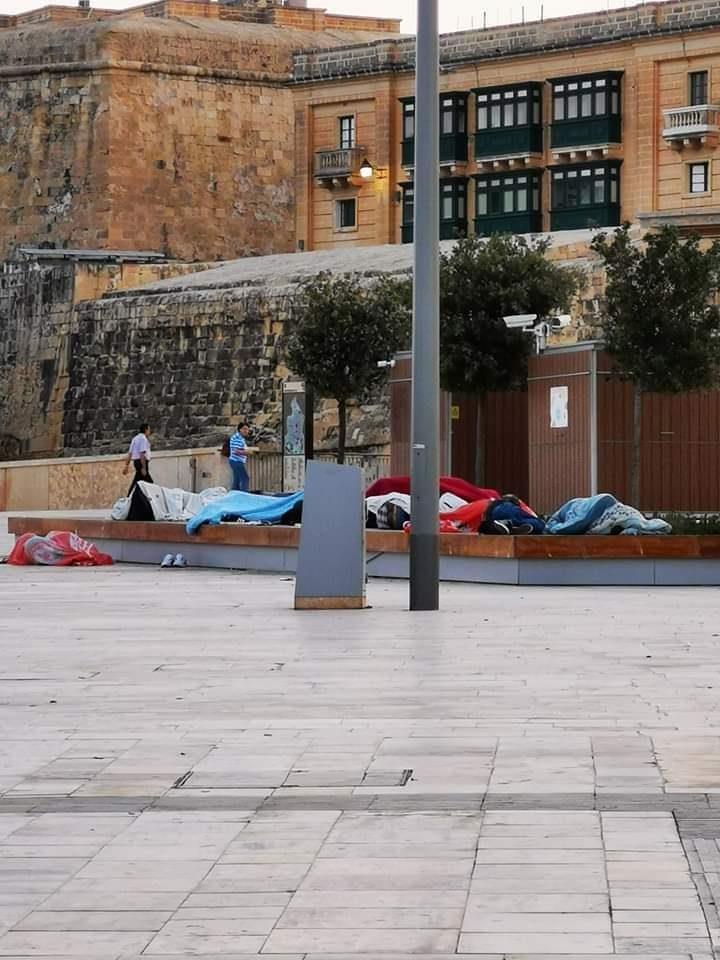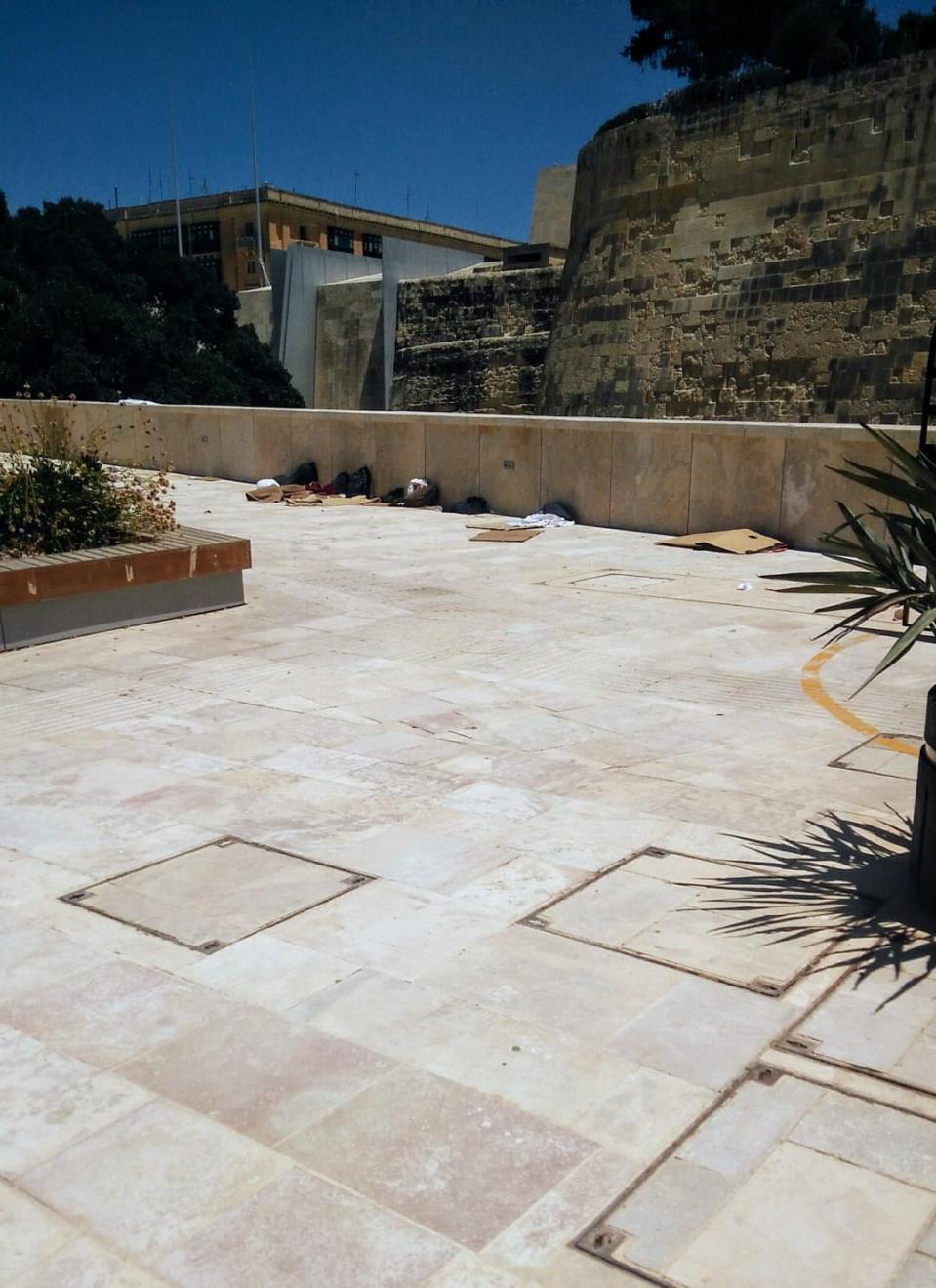The Agency for the Welfare of Asylum Seekers (AWAS) did not evict any migrants from its open centres as migrants are provided temporary accommodation for a specific period of time, a spokesperson for the Home Affairs Ministry told The Malta Independent.
Last week, social media blew up with photos and videos of migrants who had made Triton Square in Valletta their home after allegedly being evicted from the open centres in Ħal Far and Marsa due to overcrowding, leaving them without any provisions or shelter.
These homeless migrants were met with a mix of criticism and empathy from the public, with some saying that they are damaging the image of Malta’s capital city, while others felt that it was unfair for the authorities to simply chuck them out of the open centres without further assistance.
Answering questions sent by this newsroom for a concrete explanation about this situation, a spokesperson for the Home Affairs Ministry said, “kindly note that AWAS did not evict any migrants from its centres as migrants are provided temporary accommodation for a specific period of time.”
This is a procedure which has been in place since the inception of migrant centres in Malta, they explained, as migrants are only expected to leave the open centre “upon the expiry of a contract.”

The process which migrants follow upon disembarking in Malta, up until integration within society is as follows;
Firstly, they are admitted to the initial reception centre where all documentation is processed. Soon after a contract is set up between the state and the migrants for them to reside in one of Malta’s open centres; typically lasting for nine months. During this time, the migrants are encouraged to slowly assimilate into society by finding a job and alternative housing. The only exceptions to this process are vulnerable migrants who reside at the centre for a longer period than other migrants.
The spokesperson for the Home Affairs Ministry said that projects for moving into the community are already in place and migrants are supported to find alternative accommodation and legal employment. Additionally, migrants are provided psychosocial services and are constantly monitored by social workers, besides food and other material support.
Migrants may also consider applying for assisted voluntary return to the country of origin and benefit from a reintegration grant. EU funds are available for this initiative which is managed in collaboration with the International Organisation for Migration.
Nonetheless, while speaking to this newsroom, Integra Foundation Director Maria Pisani who has been in close contact with the homeless migrants and providing food and refreshments, expressed that the systems which are in place to integrate migrants into society are flawed.
“The problem in itself is systemic and it has been made worse this year with the increase in the number of arrivals and COVID-19 which contributed to a lot of problems – not to mention the lack of policy that addresses long-term needs,” she said. “The issue of transition from the open centre to life in the community has been an issue that was never addressed in a concrete or competent way.”
She went on to say that migrants who were able to make their transition into society were only able to do so through the human resources that they were able to tap into by themselves, but even this has become more difficult due to COVID-19.
“They are facing a number of barriers with finding legal and regular employment which becomes even more problematic when considering that some are still asylum seekers and have not yet been processed. They also face exploitation in the labour market, which is also compounded with racism, something that they also have to deal with finding access to housing. If they don't have any material or financial support they cannot afford housing anyway since they don't have a regular income,” Pisani said.
Since last Friday, Pisani has been informed that some of these migrants have been offered alternative housing which The Times of Malta reported to be a tent with a number of beds inside it at a football ground in Marsa.
The spokesperson for Home Affairs clarified that this tent was not set up by AWAS for this case specifically. The tent has been there since last October for emergency cases wherein the reception centre might not be able to take in all migrants that disembark in Malta when there is an influx of arrivals.

The Malta Independent also spoke with the Social Accommodation Ministry, asking if there are any plans underway to offer alternative accommodation to homeless migrants or anyone who finds themselves without a roof on top of their heads.
“The Housing Authority assists tenants in private rented accommodation from all walks of life and backgrounds with the Private Rent Housing Benefit Scheme, which has been expanded and strengthened to assist tenants in meeting their obligations and ensuring stability,” a spokesperson said.
The spokesperson added that the ministry has also begun an inter-ministerial dialogue with the Ministry for Children, Family and Social Solidarity, and has also involved multiple NGOs working in the third sector to provide solutions to the issue of rooflessness, homelessness or not having shelter. “This has facilitated the creation of the Platform Against Homelessness, headed by YMCA, which is the first initiative of its kind and has already helped dozens of individuals over the past weeks.”
From its end, the Ministry for the Family, Children’s Rights and Social Solidarity told this newsroom that it has a number of public social partnerships with different NGOs.
Whenever there is an alert about homeless persons, the Foundation for Social Welfare Services (FSWS) refers these cases to the same NGOs that receive funds from the government to give their services when needed. FSWS also has a number of services for victims of human trafficking.